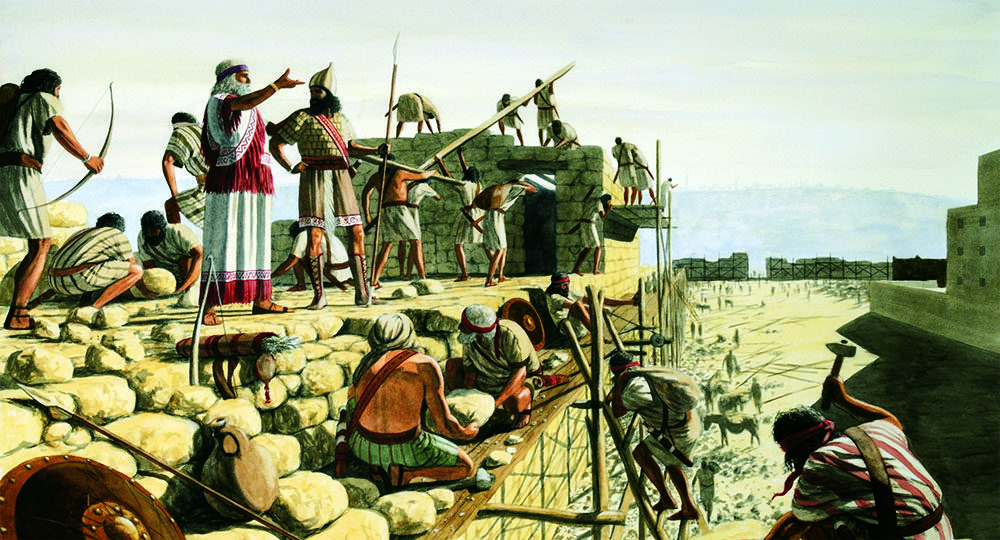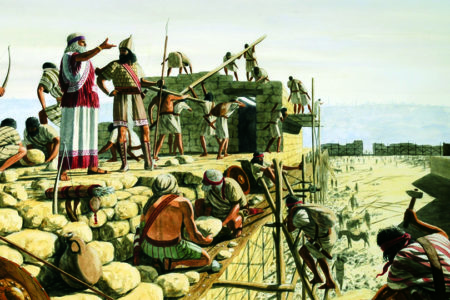Nehemiah the Leader Feb/Mar 1994
Being a leader is an unenviable calling. It appears glamorous and glorious, but it is more often lonely and thankless. The best training for a would-be leader is to observe closely the model of a proven leader. Seeing a leader in good times and bad times teaches far more than a book on leadership theory. We have the privilege of observing a good leader in action in the first six chapters of the Book of Nehemiah. Let’s look at the events in these chapters and attempt to isolate some principles of good leadership from them.
The Leader’s Concern for Others (Neh.1)
The book opens with Hanani, a kinsman of Nehemiah, coming from distant Jerusalem to see Nehemiah. He brought news of destroyed walls, burned gates, and distress among Jerusalem’s inhabitants (vv. 1–3). The news rocked Nehemiah so much that he wept, mourned, fasted, and prayed (vv. 4–11).
His emotional prayer acknowledged that the Israelites had sinned against the Lord and deserved their punishment, but he also claimed the Lord’s promise to restore His people if they returned to Him in heart and deed. Nehemiah concluded his prayer by asking God to grant him favor as he appeared in the presence of Artaxerxes.
Principles of Leadership
- A leader must draw on strength outside of himself. Nehemiah recognized that he was totally dependent on the Lord for success. Nine of his prayers are recorded in this book. Although unbelievers may be good leaders, those who humbly recognize their own limitations are more apt to find strength than are proud, self-made people.
- A good leader identifies with those being led. Nehemiah confessed other people’s sins as though they were his own (note the “we” in vv. 6–7). Although our culture stresses individuality, only leaders who identify with the failings, fears, and triumphs of their people can lead them sensitively and effectively.
- A good leader assumes responsibility for accomplishing his vision. By desiring to stand before the king, Nehemiah wanted to become part of the answer to his own prayer. There is an old saying, “Pray as if everything depended on God; work as if everything depended on you.” Only people who work in this dependent attitude find ultimate success in their labors.
The Leader and Organization (Neh. 2)
In a respectful manner, Nehemiah placed his request before the king, which resulted in his being sent to rebuild Jerusalem’s walls. However, Sanballat and Tobiah, two non-Jewish leaders of the area around Jerusalem, planned resistance to his endeavor. Nehemiah carefully inspected the walls of Jerusalem by night and urged immediate rebuilding. Geshem, an Arab, joined the opposition, and the seeds of difficulty that would be encountered later were planted.
Principles of Leadership
- A good leader carefully surveys the situation beforehand (vv. 11–16). While some tout organizational efficiency as the answer to all managerial problems, Nehemiah recognized that elaborate machinery running without the oil of the Spirit of God soon breaks down. If organization is simply defined as the orderly way to go about a task, Nehemiah certainly was organized ahead of time.
- A good leader motivates people before delegating the work (vv. 17–18). Nehemiah’s charge to Jerusalem’s citizens contained four elements: a sense of identification; an acknowledgment of Jerusalem’s plight; an appeal to a specific action; and a personal testimony. People do not follow programs but leaders who inspire them. They act when a leader stirs in them a hope of something greater than themselves-a hope to which they dare to aspire.
The Leader And The Work (Neh. 3–4)
This passage clearly delineates the manner in which Nehemiah laid out the work before him (building the wall) by delegating tasks to specific groups. There were all kinds of workers: priests, Levites, Temple servants, goldsmiths, merchants, officials, private citizens, masters, servants, men, and women. Some worked close to their homes while others served in an official capacity. Although some members of the aristocracy avoided the work (3:5), all who did work knew their assigned tasks and accepted responsibility for them.
The result was amazing. The work evidently proceeded with enthusiasm and harmony (4:6). Nehemiah had no military power to enforce his directions. His approach was to inspire a desire to work rather than enforce his own wishes. It is important to note that he also inspired others by engaging in the same sweaty, dirty work as everyone else (4:21, 23).
When rubble got in the way of the work, a major hindrance to the plan’s progress emerged. Nehemiah, however, did not avoid difficulties or unpleasantness. He faced the problem of the rubble and planned how to shift it. Through his example, hundreds labored, without equipment, harassed by foes, and plagued with setbacks, and rebuilt a city wall in 52 days (6:15).
Principles of Leadership
- A good leader sees work as a means of achieving a specific goal. Good leaders are not workaholics. They work hard without being in bondage to work itself. All work is valued by its necessity in achieving the goal.
- A good leader is not afraid to delegate work. If a leader does not delegate, it is either because he suffers from a need to cling to power or because he cannot trust others. Thus, needed tasks do not get done, and people who could have carried them out grow bored and feel useless.
- A good leader must be able to spot roadblocks and clear them. Therefore, real leaders have eliminated the tendency to procrastinate.
We often think that problems will eventually disappear if we ignore them. While this may be true in a few minor situations, those little stones may soon develop into mounds of rubble if they are too long ignored.
The Leader and Personal Attacks (Neh. 6:1–16)
When the old enemies—Sanballat, Tobiah, and Geshem (2:19)—heard that the wall was completed and the only task remaining was to set the doors in the gates, they again attempted to halt the work, but in a subtle manner. The sole object of their hatred was Nehemiah himself. In their previous attacks they had focused on opposing the Jews’ entire venture, but now they sought to remove Nehemiah from the scene or discredit his effectiveness as a leader.
Their first scheme was an assassination plot (vv. 1–4). They invited Nehemiah to a peace conference about 25 miles northwest of Jerusalem. Nehemiah, however, suspected foul play and issued an oft-quoted response. He was involved in a great project and didn’t believe that meeting with them was worth halting the work (vv. 3–4).
Their second scheme took the form of slander (vv. 59). They sent a letter supposedly revealing that Nehemiah was trying to set himself up as king of the Jews, thus threatening sedition against Artaxerxes. Nehemiah responded boldly, demonstrating his trust in God and his confidence in his position of strength (vv. 8–9).
Their third scheme was outright treachery (vv. 10–14). They tried to destroy his credibility by luring him into the Temple, even hiring a false prophet to issue a so called message from the Lord to lend authority to the scheme. Nehemiah’s discernment was evident when he recognized that no true prophet would ask someone to violate God’s law-only true priests were allowed into the sanctuary (see Num. 3:10; 18:7). Once again he committed the matter to God in prayer (v. 14).
Finally, after 52 days of steady labor, the walls were completed. The enemies’ self-confidence dissipated as they saw that the work was done with God’s help. Opposing Him, they were fighting a losing battle.
Principles of Leadership
- A good leader is not discouraged by unjust personal attacks. Leaders recognize that they will not and cannot please everyone. With confidence in God and in their own position, good leaders confidently fend off attacks and continue to move forward toward the completion of the goal.
- A good leader sees a task through to its completion. So many leaders launch a multitude of projects only to let them fizzle by neglecting to follow up with those assigned to carry out the plans.
Those serving under such poor leaders recognize that it does not matter how hard they work because the project will probably never be completed.
Someone put forth years ago the oft-repeated observation, “To be a leader you must be a reader.” There is no better place to learn about leadership than to read about the marks of an effective leader in the Book of Nehemiah.
If you would like to dig further into this subject, let me recommend two books for your consideration: Hand Me Another Brick by Charles Swindoll and Spiritual Leadership by Oswald Sanders.








Thank you, I enjoyed this article looking into what make people move to action under certain people.
I would like to receive more articles